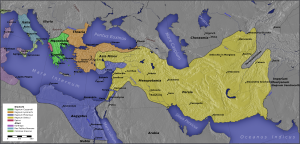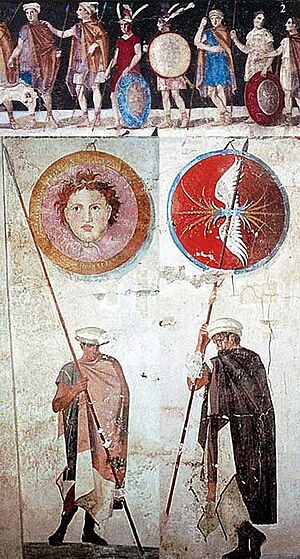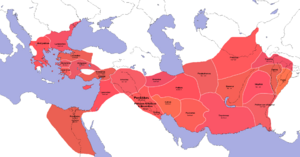Wars of the Diadochi facts for kids
Quick facts for kids Wars of Diadochi |
|||||||
|---|---|---|---|---|---|---|---|
 The various kingdoms of the Diadochi c. 301 BC |
|||||||
|
|||||||
| Belligerents | |||||||
| First War (321–319 BC): | First War (321–319 BC):
|
||||||
| Second War (318–316 BC): | Second War (318–316 BC):
|
||||||
Third War (315-311BC):
|
Third War (315-311 BC): | ||||||
| Babylon War (311–309 BC): | Babylon War (311–309 BC): | ||||||
| Fourth War (307–301 BC): | Fourth War (307–301 BC): | ||||||
| Commanders and leaders | |||||||
| First War (321–319 BC): | First War (321–319 BC): | ||||||
| Second War 318–316 BC): | Second War (318–316 BC): | ||||||
Third War (315–311 BC):
|
Third War (315–311 BC):
|
||||||
| Babylon War (311–309 BC): | Babylon War (311–309 BC): | ||||||
| Fourth War (307–301 BC): | Fourth War (308–301 BC): | ||||||
The Wars of the Diadochi were a series of big fights between the generals of Alexander the Great. These generals were called the Diadochi, which means "successors." They fought to decide who would rule Alexander's huge empire after he died. The wars happened between 322 BC and 281 BC.
Contents
- Alexander's Empire and His Generals
- The First War of the Diadochi (321–319 BC)
- The Second War of the Diadochi (318–316 BC)
- The Third War of the Diadochi (315–311 BC)
- The Babylonian War (311–309 BC)
- The Fourth War of the Diadochi (307–301 BC)
- The Struggle for Macedon (298–285 BC)
- The Final Showdown (285–281 BC)
- New Kingdoms Emerge (280–275 BC)
- Images for kids
Alexander's Empire and His Generals

Alexander the Great died on June 10, 323 BC. He left behind a massive empire. It stretched from Macedon and Greece in Europe all the way to the Indus valley in South Asia.
Alexander's death caused a big problem. He had no clear person to take over his empire. His family members were either too young or not able to rule. This led to a power struggle among his top generals.
Who Would Rule?
Two main groups formed after Alexander's death. One group, led by Meleager, wanted Alexander's half-brother, Arrhidaeus, to be king. The other group, led by Perdiccas, thought it was better to wait. Perdiccas wanted to see if Alexander's unborn child with his wife, Roxana, would be a boy.
They finally agreed on a plan. Arrhidaeus would become King Philip III. He would rule together with Roxana's child, if it was a boy. Perdiccas was chosen to be the main ruler, or regent, of the empire. But soon after, Perdiccas had Meleager and his supporters killed. This way, Perdiccas took full control.
Dividing the Empire
The generals who supported Perdiccas were given parts of the empire to govern. This was called the partition of Babylon.
- Ptolemy got Egypt.
- Antigonus received Phrygia, Lycia, and Pamphylia.
- Lysimachus received Thrace.
- Antipater and Craterus were to rule Macedon and Greece.
- Other generals also got different regions to control.
The First War of the Diadochi (321–319 BC)

Perdiccas wanted even more power. He tried to marry Alexander's sister, Cleopatra. This marriage would have given him a claim to the Macedonian throne.
In 322 BC, Antipater, Craterus, and Antigonus formed an alliance against Perdiccas. They were worried about his growing power. Ptolemy also joined this group. He even stole Alexander's body, which was on its way to Macedon.
Perdiccas tried to invade Egypt, but his generals, Peithon, Seleucus, and Antigenes, killed him. After Perdiccas's death, the generals made a new agreement. Antipater became the new regent of the empire. Antigonus was put in charge of Asia. The empire was divided again, giving more power to the main generals.
Antigonus then fought against Eumenes, who had supported Perdiccas. By 319 BC, Antigonus had defeated Eumenes and other remaining supporters of Perdiccas.
The Second War of the Diadochi (318–316 BC)
Another war started soon after. Antigonus wanted to expand his control in Asia Minor. This led to conflict with other governors.
Meanwhile, in Macedon, Polyperchon became the new regent. He tried to control the Greek cities, but Cassander, another general, stopped him. Cassander was helped by Antigonus. Polyperchon lost much of his power and retreated.
Cassander then took control of Macedon. He also gained control of Alexander's young son, Alexander IV, and his mother. Cassander became the most powerful ruler in Europe.
In the eastern part of the empire, Eumenes had gathered a new army. He joined Polyperchon's side. Antigonus, with a large army, marched against Eumenes. After two big battles that didn't have a clear winner, Antigonus finally defeated Eumenes. Eumenes was captured and executed.
By the end of this war, Antigonus controlled Asia Minor and the eastern regions. Cassander controlled Macedon and Greece. Lysimachus controlled Thrace. Ptolemy controlled Egypt, Syria, and Cyprus. Their enemies were defeated, and these four generals were now the most powerful.
The Third War of the Diadochi (315–311 BC)
Even though Antigonus was very powerful, the other generals didn't want him to rule all of Asia. In 314 BC, Ptolemy, Lysimachus, and Cassander demanded that Antigonus give up some of his lands. Antigonus refused, and another war began.
Antigonus invaded Syria and Phoenicia, which were under Ptolemy's control. He also tried to get the Greek cities to join his side by promising them freedom.
Ptolemy and Seleucus invaded from Egypt and defeated Antigonus's son, Demetrius, in the Battle of Gaza. After this battle, Seleucus went east and took control of Babylon, his old region. He then secured other eastern parts of Alexander's empire.
Antigonus made peace with Ptolemy, Lysimachus, and Cassander for a short time. But he continued fighting Seleucus to get back the eastern lands. However, Antigonus was unable to defeat Seleucus and had to give up the eastern regions.
Around this time, Cassander had the young King Alexander IV and his mother killed. This ended Alexander the Great's royal family. The generals still pretended to recognize Alexander IV as king, but it was clear they would soon claim kingship for themselves.
At the end of this war, five main generals remained:
- Cassander ruled Macedon and Thessaly.
- Lysimachus ruled Thrace.
- Antigonus ruled Asia Minor, Syria, and Phoenicia.
- Seleucus ruled the eastern regions.
- Ptolemy ruled Egypt and Cyprus.
Each of them was now acting like a king, even if they didn't officially use the title yet.
The Babylonian War (311–309 BC)
This was a conflict between Antigonus I Monophthalmus and Seleucus I Nicator. Seleucus won this war. This victory meant that Alexander the Great's empire would never be put back together again. This was confirmed later in the Battle of Ipsus.
The Fourth War of the Diadochi (307–301 BC)
Ptolemy was expanding his power in the Aegean Sea and to Cyprus. Seleucus was busy securing his control over the vast eastern lands. Antigonus started the war again. He sent his son, Demetrius, to take back control of Greece.
In 307 BC, Demetrius captured Athens and declared the city free. Demetrius then attacked Ptolemy, invading Cyprus. He defeated Ptolemy's fleet in a big naval battle. After this victory, Antigonus and Demetrius both declared themselves kings. Soon after, Ptolemy, Seleucus, Lysimachus, and Cassander also took the title of king.
In 306 BC, Antigonus tried to invade Egypt, but bad weather stopped him. Demetrius then besieged the island of Rhodes. The island was helped by troops from Ptolemy, Lysimachus, and Cassander. The people of Rhodes eventually made a deal with Demetrius. They would support Antigonus and Demetrius against everyone except Ptolemy. Ptolemy was called "Soter" (Savior) for his help.
Demetrius then focused on Cassander in Greece. He freed cities and drove Cassander's forces out of central Greece. Demetrius also formed a new Greek alliance, the League of Corinth. He and his father were its leaders.
Cassander asked for peace, but Antigonus refused. Demetrius invaded Thessaly, where he fought Cassander. But then, Lysimachus invaded Asia Minor. Demetrius had to leave Greece to help his father.
Lysimachus, with help from Cassander, took over much of western Asia Minor. But Antigonus and Demetrius trapped him near Ipsus. This is where Seleucus arrived with his army. He helped Lysimachus defeat Antigonus in the Battle of Ipsus. Antigonus was killed in the battle. Demetrius fled back to Greece.
Lysimachus and Seleucus divided Antigonus's lands in Asia between them. Lysimachus got western Asia Minor, and Seleucus got the rest.
The Struggle for Macedon (298–285 BC)
The next few years were about who would control Macedon. Cassander died in 298 BC. His sons were weak rulers. One of them, Alexander V, asked Demetrius for help. Demetrius had kept control of Cyprus and other areas. He invaded Macedon, killed Alexander, and took control of Macedon himself in 294 BC.
While Demetrius ruled Greece, his other lands were taken by Lysimachus, Seleucus, and Ptolemy. Soon, Demetrius was forced out of Macedon by Lysimachus and Pyrrhus. They divided Macedon between them. Demetrius then tried to invade the east but was captured by Seleucus and died two years later.
The Final Showdown (285–281 BC)
Lysimachus and Pyrrhus fought over Macedon, with Lysimachus eventually taking all of it. In Egypt, the old Ptolemy chose his younger son, Ptolemy Philadelphus, to be his heir. His older son, Ptolemy Ceraunus, fled to Seleucus.
In 282 BC, Lysimachus had his own son, Agathocles, killed. Agathocles's wife fled to Seleucus. Seleucus then fought Lysimachus and killed him in the Battle of Corupedium in 281 BC. Seleucus hoped to take control of Lysimachus's lands in Europe. But in 281 BC, soon after arriving in Thrace, Seleucus was killed by Ptolemy Ceraunus.
New Kingdoms Emerge (280–275 BC)
Ptolemy Ceraunus didn't rule Macedon for long. Tribes of Gauls invaded Macedon and Greece. Ptolemy Ceraunus was killed by these invaders. After a few years of confusion, Demetrius's son, Antigonus Gonatas, became the ruler of Macedon. In Asia, Seleucus's son, Antiochus I, also defeated the invaders.
Finally, almost 50 years after Alexander's death, things settled down.
- Ptolemy ruled over Egypt and parts of southern Asia Minor.
- Antiochus ruled the Asian parts of the empire.
- Antigonus ruled Macedon and Greece.
These three main kingdoms would last for many years.
Images for kids
 | Jackie Robinson |
 | Jack Johnson |
 | Althea Gibson |
 | Arthur Ashe |
 | Muhammad Ali |



